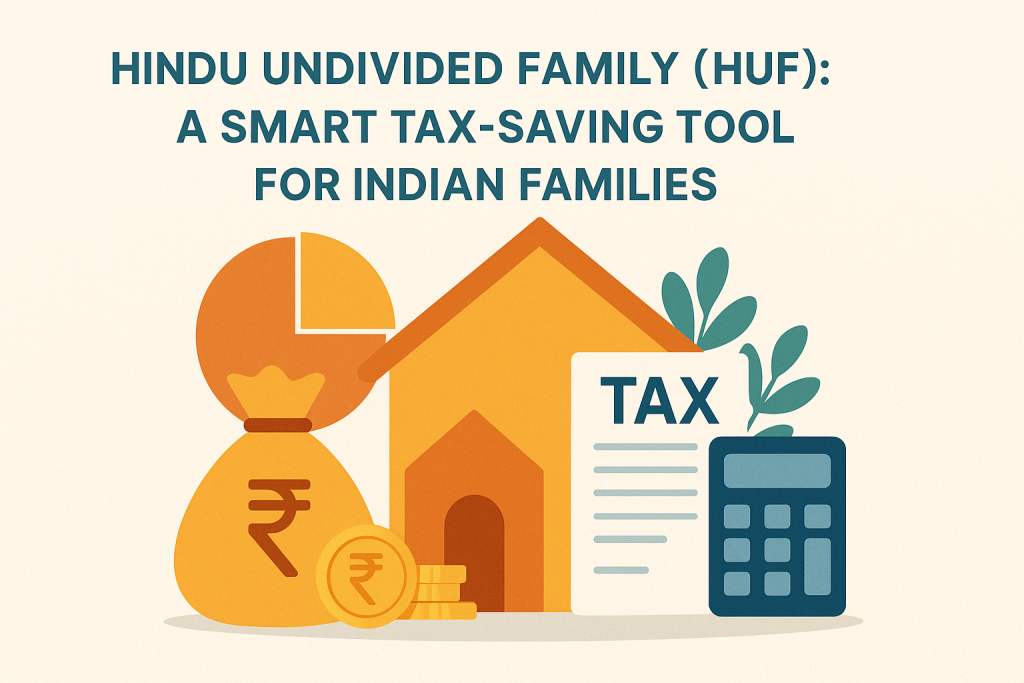Hindu Undivided Family (HUF): A Smart Tax-Saving Tool for Indian Families
Tax planning is essential for every earning individual. While most are aware of deductions under sections like 80C, one lesser-known but powerful tool available under Indian tax law is the Hindu Undivided Family (HUF). If used properly, an HUF can help you reduce your overall tax liability significantly — all within the framework of the law.
What is an HUF?
An HUF, or Hindu Undivided Family, is a unique entity recognized under Hindu law and treated as a ‘person’ under Section 2(31) of the Income Tax Act, 1961. It consists of lineal descendants from a common ancestor — typically a family with at least three generations — including their spouses and unmarried children.
The HUF is considered a separate entity for tax purposes and can hold assets, earn income, and file income tax returns independently of its members.
Who Can Form an HUF?
While the term says “Hindu,” the following communities are eligible to form an HUF:
- Hindus
- Buddhists
- Jains
- Sikhs
All members must belong to the same family. Once a Hindu male gets married, a new HUF is presumed to be formed automatically. However, for legal and taxation purposes, it must follow a formal creation process.
How to Form an HUF?
To legally establish an HUF, follow these steps:
- Draft an HUF Deed
- Clearly state the names of the coparceners (family members).
- Appoint the Karta (usually the eldest male member of the family).
- Apply for a PAN Card in the Name of the HUF
- Open a Bank Account in the Name of the HUF
Once these steps are completed, the HUF is recognized as a legal tax entity.
Members of an HUF: Karta and Coparceners
- Karta: The head of the HUF (typically the eldest male), responsible for managing affairs.
- Coparceners: Other family members including spouse and children who have equal legal rights in the family assets.
Who Can Contribute Assets?
- The Karta can contribute personal assets or ancestral property to the HUF.
- Coparceners can also transfer assets voluntarily.
However, care must be taken regarding tax implications of such transfers.
How is HUF Taxed?
An HUF enjoys all tax benefits and deductions similar to an individual taxpayer:
- HUF has a separate PAN and files its own tax return.
- Income is taxed as per normal slabs.
- Deductions under Section 80C, 80D, etc., are allowed.
- Salaries can be paid to members for services rendered, which can be claimed as a business expense by the HUF.
- Income from HUF investments is taxed in the hands of the HUF, not individual members.
Example: How HUF Saves Taxes
Let’s say Mr. X has a salary income of ₹20 lakhs per annum. He also receives ₹7.5 lakhs as rental income from property inherited from his father. Without HUF, his total income is taxed as one.
After creating an HUF, the inherited property is transferred to the HUF. Here’s the comparison:
Particulars | Mr. X (Before HUF) | Mr. X (After HUF) | HUF |
Salary Income | ₹20 lakhs | ₹20 lakhs | – |
Property Rent | ₹7.5 lakhs | – | ₹7.5 lakhs |
Standard Deduction (30%) | ₹2.25 lakhs | – | ₹2.25 lakhs |
Net Income from Property | ₹5.25 lakhs | – | ₹5.25 lakhs |
Total Taxable Income | ₹25.25 lakhs | ₹20 lakhs | ₹5.25 lakhs |
Section 80C Deduction | ₹1.5 lakhs | ₹1.5 lakhs | ₹1.5 lakhs |
Net Taxable Income | ₹23.75 lakhs | ₹18.5 lakhs | ₹3.75 lakhs |
Tax Payable | ₹5,53,625 | ₹3,91,400 | ₹7,725 |
💡 Total Tax After HUF: ₹3,91,400 (Mr. X) + ₹7,725 (HUF) = ₹3,99,125
✅ Tax Saved: ₹5,53,625 – ₹3,99,125 = ₹1,54,500
Both Mr. X and the HUF can independently claim deductions under Section 80C, effectively doubling the benefit.
Advantages of Creating an HUF
- Separate Legal Entity
Reduces overall tax liability by splitting income across entities. - Additional Tax Exemptions
Enjoys full tax slab benefits just like an individual (e.g., no tax up to ₹2.5–5 lakhs). - Asset Management
Easier to manage family property and investments in a structured manner.
Disadvantages of HUF
- Karta Holds Central Authority
Unequal influence may lead to disputes in some cases. - Equal Rights for Coparceners
All coparceners have equal rights, which may create conflict over property or income distribution. - Compliance Burden
Additional PAN, bank account, return filings, and documentation required.
Conclusion
An HUF is a powerful tax planning and wealth management tool for Indian families. By creating a separate taxable entity, it helps high-income earners significantly lower their tax outgo. While it does involve some additional paperwork and formalities, the benefits far outweigh the hassles.
👉 If you belong to a Hindu, Sikh, Jain, or Buddhist family and are in a higher income tax bracket, it’s time to seriously consider forming an HUF.




